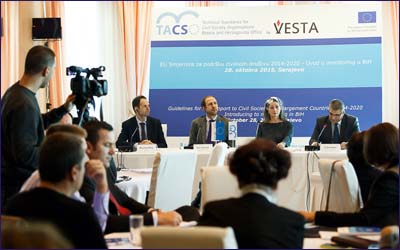
Civil Society
On October 28th 2015, there was a conference held to discuss “EU Guideline for civil society 2014-2020, Introduction to monitoring in Bosnia and Herzegovina.” The conference established a platform for unique harmonized messages about the importance of the process and validation of sources to be used by 2020, estimation of changes in the environment in the next two years period of what can be measured and how, and providing unique learning opportunity for key stakeholders and CSO environment related to EU Guidelines framework. (source) Although currently, Bosnia’s political leadership has failed to form a government since the elections in October of 2010. This left the country in the worst political and social crisis since the end of the war. The civil society in Bosnia has become an isolated sector, making it detached from the real needs and interests of ordinary people. Most of the time, it seems as though many Civil Society Organizations worry most about getting funding from the government, regardless of how useful the project will be for social and political changes. In order to move forward from this, it is best to put pressure on domestic politicians to work in the interests of the citizens. (source)
Major NGO’s
On Bosnia’s governmental website, there are a list of the most important independent bodies (NGO’s) in the country.
Top Three:
- Centre for Civic Initiatives: NGO that works across Bosnia and Herzegovina with a mission to promote and initiate citizens’ participation in development of civil society. Also aspires to respond to the citizens needs for their higher-level presence and active role in political life of the country. (source)
- Centre for Free Access to Information: NGO whose mission is to promote the Freedom of Access to Information Act throughout Bosnia and Herzegovina. Provides training, advice, and free legal representation to those seeking information to resolve personal issues or to participate in the democratic process. (source)
- Centre for Peace an Multiethnic Cooperation: NGO that researches and documents important events which took place in the recent history of Mostar and Herzegovina. (source)
Based on the lack of information, Bosnia does not participate much in international NGOs, but more so focus on the domestic NGOs within the country. Although they do receive quite a bit of funding and aid from international, governmental organizations to help aid and reconstruct after the war. For example, USAID helps Bosnia and Herzegovina progress toward a harmonized economy, effective and transparent government institutions with a strong civil society, and a muiti-ethnic, tolerant society. (source)
In conclusion, with Bosnia’s economic downfall since the war there has been a lot of aid from inside and outside the country to help pave a way for progression. Like mentioned before, in order for the country to move forward there has to be pressure on domestic politicians to work in the interests of their citizens.